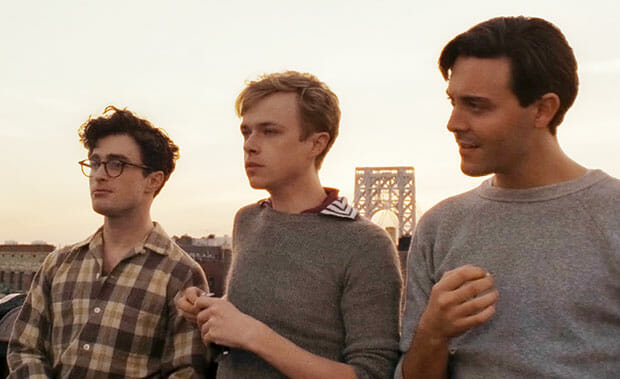As titular proclamations go, Kill Your Darlings is the year’s most gloriously evocative. (Take that, Only God Forgives.) Director John Krokidas perfectly captures the elation that goes along with breaking down convention for the sake of unfettered creation, specifically here with the fruitful nascence of Greenwich Village progressivism and the beat generation. The usurping clan—wide-eyed and eager Columbia University students Allen Ginsberg (Daniel Radcliffe), Jack Kerouac (Jack Huston) and Lucien Carr (Dane DeHaan)—frequent downtown jazz clubs and smoke-filled house parties, finding endless inspiration in the motley crowds of intermingling races, sexualities and ideologies. It’s a toothsome time of graspable change, when the sky had no limit and when fantasies came true.
The best reminiscences of this period come from the novelistic band-of-brothers most intrinsically linked with it; they were the scene’s most devoted participants. Unlike last year’s ill-fated adaptation of Kerouac’s On the Road, Krokidas’s film casts a wider net, tracing the inception of the movement that inspired those works by waxing nostalgic on the friendships and tribulations that occurred within. Darlings is an ensemble piece: Radcliffe’s Ginsberg may be the film’s ostensible protagonist, but his formative interactions and growing pains, and the catalysts for them, are just as legendary.
Daniel Radcliffe has exchanged Harry Potter’s lightning scar for Ginsberg’s dramatically coiffured hair and emo/hipster glasses. His Ginsberg first encounters rabble-rouser Lucien Carr in the Columbia University library during a guided tour: As a guide regales an audience on the university’s collection of important works and first editions, Carr animatedly recites Henry Miller, gyrating on a table and making a spectacle. Carr’s attempt to liberate this “restricted” book from the shackles of tradition’s oppression establishes a principal arc of the film’s trajectory, pitting the old and the new guard against one another.
In Carr, Ginsberg finds not only a muse but also a catalyst for his own personal expression; their creative relationship becomes romantic. Carr longs to develop new modes of written expression but lacks the necessary talent to do so. He magnetically externalizes that insecurity so as to draw people toward him who can help realize his dreams, people such as drug-addled existentialist William S. Burroughs (Ben Foster), and David Kammerer (Michael C. Hall), with whom he shares a longstanding and troubled love affair. By the time Kerouac’s sensitive alpha male enters the picture, the group is ready to share its manifesto, “the new vision,” and go about the business of contributing to it.
The film works best when the characters’ freewheeling creative process is channeled into Krokidas’s filmmaking techniques, namely through exhilarating montages, snappy dialogue, and frenetic, charismatic performances; this is the majority of the film. “I want my entire life to be comprised of first times,” Carr says to Ginsberg one drunken night. He’s full of notable bon-mots such as this, and even though they come fast and often, they never feel like a cheap screenwriting technique. The effervescent tone is buoyed by impeccable period detail, making Kill Your Darlings feel every bit as alive as the era it recreates.
This immersion pulls the viewer into Carr and Ginsberg’s complicated dynamic, which is one of the most fully realized queer romances in recent cinema. Like so many historical relationships that comprise both artistic creation and romantic involvement, theirs is inspiring, frustrating, bombastic and ultimately tragic. (Despite the openness in his social circle, Carr’s struggle with his own sexuality became a road block, occasionally in his relationship with Ginsberg but mostly with Kammerer, the man who acted as his protector. As their relationship fell apart, Carr’s self-destructive tendencies started to affect everyone in his social circle.) Koridas identifies the myriad subplots generated by their complicated relationship as the impetus behind one of the most canonized movements in modern art.
Kill Your Darlings stumbles in Ginsberg’s backstory, which feels unnecessary and, as a result, slows the momentum at crucial moments. It’s an understandable conceit in a story that yearns to show a progression from tradition to futurism, but here it adds little. His parents, played by Jennifer Jason Leigh and David Cross, have their struggles, especially her mental illness and their divorce, but their issues fail to add enough gravity to Ginsberg’s situation to merit the screen time they are given.
This is a minor stumble, as the film is mostly an enthralling origin story and crucial revisionist work. The tales that compose this origin can be found in the writers’ various subsequent work, but Krokidas distills them into one particularly fruitful period and catalyzing event. Most importantly, the film positions Carr as the figure from whom these prolific writers may have drawn for some of their most famous writing. Whether one believes this or not, the fantastic performances of Radcliffe and DeHaan, especially, make Kill Your Darlings an intriguing version of the Beat Generation.
Director: John Krokidas
Writer: John Krokidas, Austin Bunn
Starring: Daniel Radcliffe, Dane DeHaan, Ben Foster, Jack Huston, Michael C. Hall, Jennifer Jason Leigh, David Cross, Elizabeth Olson, Kyra Sedgwick
Release Date: Oct. 18, 2013
